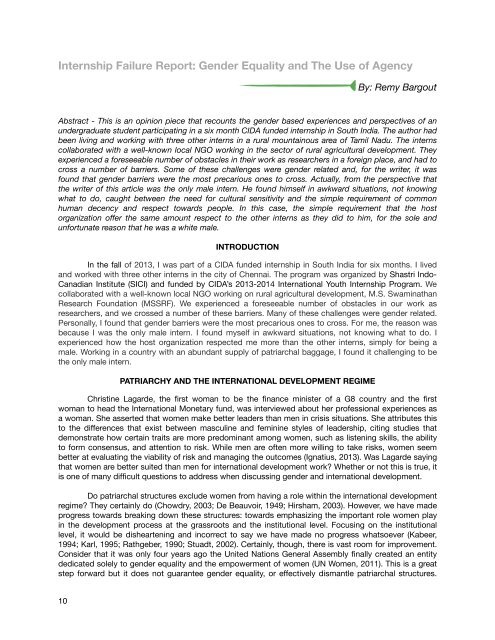Undercurrent-Issue-Fall-Winter-2014-3
Undercurrent-Issue-Fall-Winter-2014-3
Undercurrent-Issue-Fall-Winter-2014-3
Create successful ePaper yourself
Turn your PDF publications into a flip-book with our unique Google optimized e-Paper software.
Internship Failure Report: Gender Equality and The Use of AgencyBy: Remy BargoutAbstract - This is an opinion piece that recounts the gender based experiences and perspectives of anundergraduate student participating in a six month CIDA funded internship in South India. The author hadbeen living and working with three other interns in a rural mountainous area of Tamil Nadu. The internscollaborated with a well-known local NGO working in the sector of rural agricultural development. Theyexperienced a foreseeable number of obstacles in their work as researchers in a foreign place, and had tocross a number of barriers. Some of these challenges were gender related and, for the writer, it wasfound that gender barriers were the most precarious ones to cross. Actually, from the perspective thatthe writer of this article was the only male intern. He found himself in awkward situations, not knowingwhat to do, caught between the need for cultural sensitivity and the simple requirement of commonhuman decency and respect towards people. In this case, the simple requirement that the hostorganization offer the same amount respect to the other interns as they did to him, for the sole andunfortunate reason that he was a white male.INTRODUCTIONIn the fall of 2013, I was part of a CIDA funded internship in South India for six months. I livedand worked with three other interns in the city of Chennai. The program was organized by Shastri Indo-Canadian Institute (SICI) and funded by CIDA’s 2013-<strong>2014</strong> International Youth Internship Program. Wecollaborated with a well-known local NGO working on rural agricultural development, M.S. SwaminathanResearch Foundation (MSSRF). We experienced a foreseeable number of obstacles in our work asresearchers, and we crossed a number of these barriers. Many of these challenges were gender related.Personally, I found that gender barriers were the most precarious ones to cross. For me, the reason wasbecause I was the only male intern. I found myself in awkward situations, not knowing what to do. Iexperienced how the host organization respected me more than the other interns, simply for being amale. Working in a country with an abundant supply of patriarchal baggage, I found it challenging to bethe only male intern.PATRIARCHY AND THE INTERNATIONAL DEVELOPMENT REGIMEChristine Lagarde, the first woman to be the finance minister of a G8 country and the firstwoman to head the International Monetary fund, was interviewed about her professional experiences asa woman. She asserted that women make better leaders than men in crisis situations. She attributes thisto the differences that exist between masculine and feminine styles of leadership, citing studies thatdemonstrate how certain traits are more predominant among women, such as listening skills, the abilityto form consensus, and attention to risk. While men are often more willing to take risks, women seembetter at evaluating the viability of risk and managing the outcomes (Ignatius, 2013). Was Lagarde sayingthat women are better suited than men for international development work? Whether or not this is true, itis one of many difficult questions to address when discussing gender and international development.Do patriarchal structures exclude women from having a role within the international developmentregime? They certainly do (Chowdry, 2003; De Beauvoir, 1949; Hirsham, 2003). However, we have madeprogress towards breaking down these structures: towards emphasizing the important role women playin the development process at the grassroots and the institutional level. Focusing on the institutionallevel, it would be disheartening and incorrect to say we have made no progress whatsoever (Kabeer,1994; Karl, 1995; Rathgeber, 1990; Stuadt, 2002). Certainly, though, there is vast room for improvement.Consider that it was only four years ago the United Nations General Assembly finally created an entitydedicated solely to gender equality and the empowerment of women (UN Women, 2011). This is a greatstep forward but it does not guarantee gender equality, or effectively dismantle patriarchal structures.10


